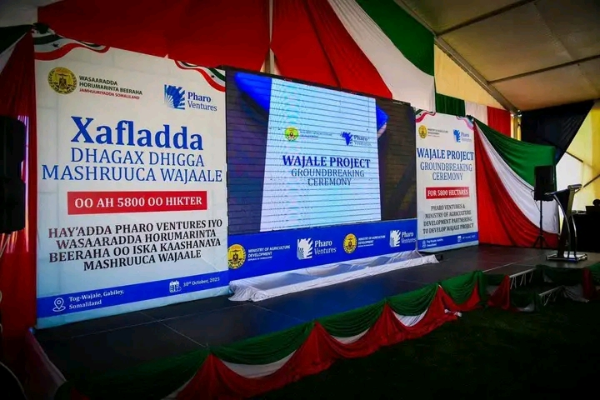The government of Somaliland has officially launched a landmark agricultural initiative that aims to transform the pastoral and arid Wajaale plains into a modern farming hub and move the region closer to food self-sufficiency.
President Abdirahman Mohamed Abdillahi ‘Irro’, on 31 October 2025, laid the foundation stone of the Wajaale Agricultural Development Project, implemented by the international development agency Pharo Foundation.
Described by the President as “the largest project to be implemented in Tog Wajaale District in 65 years,” the initiative is designed to enhance domestic food production, boost job creation, and strengthen resilience to climate stress.
Project planners say the programme will introduce modern farming techniques, year-round irrigation through dams and other water infrastructure, fodder production for livestock, and environmental protection measures targeting soil erosion and land degradation.
Aims and benefits
President Irro emphasised that one of the core goals is food self-sufficiency for Somaliland. “The most important aspect of this project is that it will give us food self-sufficiency. I hope that once completed, it will provide us with enough food,” he said.
The scheme is expected to deliver multiple benefits: increased employment opportunities for the Wajaale area and surrounding communities, improved incomes and services, and a wider boost to the regional economy.
The Pharo Foundation, via its “Pharo Ventures” arm, will oversee modernisation of farming, construction of dams and irrigation systems, development of fodder and livestock production, and implementation of sustainable land-use practices.
Strategic importance and context
The project is being hailed by government officials and project partners as a strategic turning point for Somaliland’s agriculture sector, which has faced persistent challenges in water scarcity, degraded soils, and low productivity.
The Wajaale initiative marks a shift towards more intensive, technology-driven agriculture rather than purely pastoral, rain-fed systems.
In particular, the water infrastructure components — dams and year-round irrigation — are seen as critical given the region’s vulnerability to climate shocks and erratic rainfall. The initiative also aims to prevent desertification and manage land degradation in the Wajaale plains.
Looking ahead
While the launch was celebrated, the path ahead will require sustained investment, strong implementation and local participation.
The Pharo Foundation has pledged its commitment to the long-term success of the project, emphasising that sustainable livelihoods based on knowledge, technology and essential services are central to its mission.
For Somaliland, the project offers a flagship example of how agricultural transformation may underpin broader economic growth, reduce dependence on food imports, and bolster national resilience.
If successfully scaled, it could serve as a model for similar semi-arid regions seeking to revamp their agriculture and food security outlooks.
As the groundwork begins and infrastructure starts to take shape, all eyes will be on how the Wajaale initiative moves from vision to tangible harvests.








